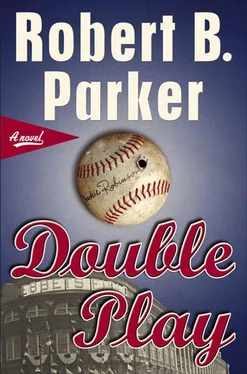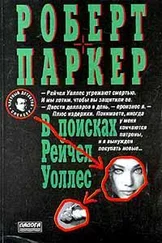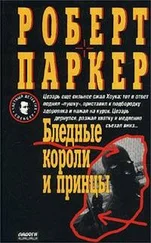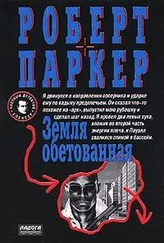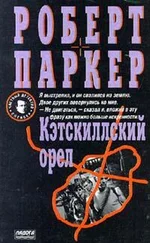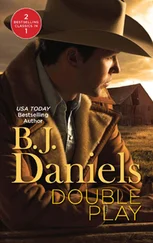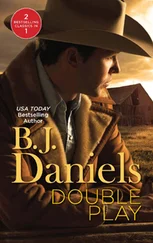A white-haired Negro man gestured Jackie toward the empty chair at the table.
“Sit down, Jackie,” he said. “Sit down, please.”
Jackie sat. Burke found a chair against the wall near the door and sat in it. Everyone was quiet. Jackie waited.
“Jackie,” the white-haired Negro said, “perhaps you could ask your friend to wait outside for us?”
Jackie shook his head.
“What we have to say, Jackie, is really rather confidential.”
“He stays,” Jackie said.
“We are not comfortable with that,” the white-haired Negro said.
Jackie leaned forward at the table. Burke sat on his chair by the door as if they were talking of someone else.
“Why is that?” Jackie said.
The white-haired man didn’t speak for a moment. He looked at the other men around the table.
“He’s not one of us,” the white-haired man said.
Jackie nodded slowly, his hands clasped before him at the table.
“I have trusted him with my life for the last four months,” he said. “You gonna have to trust him for an hour. Or both of us leave.”
One of the other men at the table spoke.
“Okay, Bascomb,” he said. “Let it go.”
He was a big muscular man who had gotten fat. His nose had been broken. There were scars around his eyes, and his hands looked thicker than they should have, and a little misshapen. He looked steadily at Burke as he spoke. His black oval eyes didn’t blink. Burke looked back.
“Bascomb’s a lawyer,” the big man said. “He can’t help himself.”
Burke shrugged.
“You used to fight,” the big man said.
“You, too,” Burke said.
“You win,” the big man said.
“Some,” Burke said.
“But not enough to keep doing it.”
“No,” Burke said.
“Me either,” the big man said.
He turned back to Jackie.
“You know everybody in this room,” the big man said. “Hell, you played for a couple of them.”
Jackie nodded.
“We gave you a chance to play,” the big man said, “and treated you as good as we could.”
“Probably did, Maurice,” Jackie said. “Doesn’t mean it was good.”
“I know,” Maurice said. “Money’s hard and it’s harder if you’re a black man.”
Jackie didn’t say anything. The other men at the table were motionless. The rain was steady against the windows. Burke was silent beside the door.
“Here’s the situation,” Maurice said. “You stay in the white leagues and pretty soon some other boys be following you.”
Jackie nodded.
“And pretty soon all the teams, St. Louis, everybody, be getting Negro players,” Maurice said, “and we won’t have no players that matter, and the fans won’t come, and the Negro leagues are gone.”
Jackie nodded.
“You unnerstand that?” Maurice said.
“I do.”
“That’s gonna come no matter what anyone says now.”
“I think that, too,” Jackie said.
“So what happens,” Maurice said. “Not just to us, but to all the players — the ones that ain’t good enough, or be too old now. Where they gonna play?”
Jackie shook his head.
“You don’t know,” Maurice said. “And we don’t know either.”
“I can’t stop that happening,” Jackie said.
“We think you can,” Maurice said. “Tell him, Bascomb.”
The white-haired man cleared his throat twice.
“You know, Jackie, how much DiMaggio is making?”
“Yes.”
“You could make that much.”
“Maybe I will,” Jackie said.
“We prepared to pool our money, all the owners, and pay you what they pay DiMaggio, if you’ll play for any team in the Negro leagues.”
“Any team?”
“Don’t matter which.”
“And I don’t play for the Dodgers anymore.”
“No.”
“DiMaggio’s making eight times what I make,” Jackie said.
“You be worth it,” Bascomb said. “And you save the leagues. Give jobs to a lotta colored players.”
Jackie sat back in his chair and unfolded his hands and put them flat on the tabletop. He looked at the men gathered at the table. Then he looked at Burke. Burke didn’t move. Jackie looked back around the table again.
“I can’t do that,” he said.
“You mean you won’t,” Bascomb said.
“Whatever you like,” Jackie said.
“We could probably up the ante,” Bascomb said.
“No,” Jackie said.
“You unnerstand,” Maurice said, “what it would mean to a lot of colored folks.”
“What I’m doing now means something.”
“Maybe what we’re asking would mean more,” Maurice said.
“No,” Jackie said. “It wouldn’t.”
It was still raining as Burke drove downtown. The taillights of the cars were like jewels in the rain. Jackie sat beside Burke staring through the front windshield where the wipers moved back and forth. His hands were clenched and he began to tap his thighs with them. The tapping got hard.
“Lotta money,” Burke said.
“Everybody wants a piece,” Jackie said as if Burke hadn’t said anything. “Everybody wants a damn piece.”
“Nothing new there,” Burke said.
“I know.”
“Take it as a compliment,” Burke said.
“Thing is what they say make some sense,” Jackie said. “Be other colored players coming along after me, and eventually all the good ones be playing in the white leagues.”
“Ain’t that sort of the idea?” Burke said.
“Be putting a lotta Negroes out of business,” Jackie said. “The Negro leagues go under, and a lot of Negro players, the ones with less skill, gonna be out of a job.”
“True for white players too,” Burke said.
“White?” Jackie said.
“Every Negro comes into the major leagues,” Burke said, “is one less white man.”
Jackie was silent for a moment as they drove downtown in the rain.
“Hadn’t thought of that,” he said after a while.
“Nothing’s simple,” Burke said. “You’re doing a good thing.”
Jackie looked at Burke in silence for almost a full block.
Then he said, “Burke, you been thinking about this. I didn’t know you thought about anything.”
“I got nothing else to do,” Burke said.
“So what else do you think?”
“Don’t you read Time magazine? You’re conducting a fucking social experiment.”
Jackie nodded.
“And when it’s over,” Burke said, “five years down the line, ten, whenever, the best players are the ones gonna make the show. Spics, spades, Yids, Arabs, Eskimos, Japs, fat guys from Baltimore, whoever can make it, makes it.”
Jackie didn’t say anything. Burke didn’t say anything else. The city glistened as they drove through it. The rain-washed cabs were clean yellow. The traffic lights blurred by the rain looked like wet flowers. Every lighted window along the street looked cozy behind the steady gray rain slant. Restaurants looked inviting. The streets were shiny black. The people on the streets and in the doorways, collars up, umbrellas opened, looked peaceful. A policeman in a gleaming slicker and hat was directing traffic around a street excavation. Burke slowed, but the cop waved him forward. And they drove on past.
Burke’s phone rang in the morning while he was still asleep. He glanced at his wristwatch on the night table as he answered. It was 6:10.
Burke said, “Hello.”
He could hear breathing at the other end of the phone line, but no one spoke. He fumbled a cigarette from the package beside his watch, and lit it. On an empty stomach it tasted harsh.
“Hello?” he said.
Breathing.
“I’ll give it one more hello,” Burke said.
“It’s me,” a voice said.
Читать дальше
